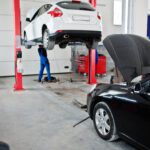Your car is built to provide reliable and safe transportation, but like any machine, it requires regular maintenance and prompt attention when issues arise. Ignoring warning signs from your car can lead to costly repairs, breakdowns, or even unsafe driving conditions. Understanding these warning signs can make all the difference, helping you prevent minor issues from escalating into major problems. Here’s a guide to the top five warning signs that your car needs immediate attention.
Table of Contents
Toggle1. Unusual Noises
Modern cars are designed to operate quietly, so unusual noises often signal a problem. Different types of sounds indicate various issues, so it’s essential to understand what your car might be trying to tell you:
- Squealing or Screeching from the Brakes
If you hear a high-pitched squeal when you apply the brakes, your brake pads may be worn down and need replacement. Ignoring this sound can lead to metal-on-metal contact, which can severely damage the braking system. - Grinding Sounds
Grinding noises, especially when braking, could indicate that the brake pads are entirely worn down, and the rotors are being damaged. However, grinding sounds from the engine or transmission could also signal problems with gears or bearings, which require immediate professional diagnosis. - Rattling or Knocking from the Engine
Knocking or rattling sounds from under the hood often point to engine problems. This could indicate issues with the pistons, camshaft, or other vital engine parts. Engine knocking is a serious issue and could lead to engine failure if left untreated. - Hissing or Whistling
A hissing sound could indicate a coolant or air leak. Whistling can suggest a vacuum leak, which can reduce engine performance and fuel efficiency. Either of these sounds calls for immediate attention from a mechanic to prevent engine overheating or performance issues.
Ignoring unusual noises can lead to expensive repairs and, more importantly, compromise your safety. It’s best to have any unusual sounds inspected as soon as you notice them.
2. Warning Lights on the Dashboard
Dashboard warning lights are your car’s way of alerting you to potential problems. Modern vehicles are equipped with sophisticated sensors that can detect issues in real time. Ignoring these warning lights can lead to major mechanical problems and costly repairs.
- Check Engine Light
The check engine light is one of the most common warning lights and can indicate a range of issues, from a loose gas cap to serious engine problems. If the light is flashing, it often means there’s a significant problem that needs immediate attention, such as a misfire that could damage your catalytic converter. - Oil Pressure Light
This light comes on when there’s an issue with your oil pressure, which could mean low oil levels or an issue with the oil pump. Running a car with low oil pressure can lead to severe engine damage, so it’s best to stop driving and check your oil level right away. - Battery Light
The battery light may come on if your car’s electrical system is having trouble, which could be caused by a dying battery, a failing alternator, or loose connections. Ignoring this light may leave you stranded with a dead battery. - Brake System Warning Light
This light indicates a problem with your braking system. It could mean low brake fluid, worn-out brake pads, or a malfunction in the braking system. Driving with a brake system warning is dangerous, so have it checked immediately. - Temperature Warning Light
When the temperature warning light appears, it indicates that the engine is overheating. Pull over safely, turn off the engine, and let it cool down before driving further. Continuing to drive an overheated engine can cause significant damage.
3. Fluid Leaks
Cars rely on various fluids to keep parts lubricated and systems running smoothly. Leaks are often easy to spot and can indicate serious issues if not addressed promptly. Each fluid serves a specific purpose, and losing them can result in system failures.
- Oil Leaks
Motor oil is essential for lubricating the engine and preventing excessive friction. If you notice dark brown or black puddles under your car, it’s likely an oil leak. Ignoring an oil leak can lead to engine wear and eventually costly repairs. - Coolant Leaks
Coolant, or antifreeze, is critical for preventing your engine from overheating. Coolant leaks appear as bright green, orange, or pink puddles. Low coolant levels can cause overheating, leading to potential engine damage. If you suspect a coolant leak, it’s crucial to have it fixed immediately. - Transmission Fluid Leaks
Transmission fluid is typically red or pink and helps keep your car’s gears shifting smoothly. Leaks can lead to transmission issues and make it difficult to shift gears, which can be dangerous if left unaddressed. - Brake Fluid Leaks
Brake fluid leaks are rare but serious. A brake fluid leak can compromise your braking system’s effectiveness, putting you and others at risk. Brake fluid typically has a clear to yellowish colour and a slick, oily texture.
Fluid leaks are serious and should be addressed promptly by a professional mechanic. Regularly checking for leaks can help you catch problems early and avoid expensive repairs.
4. Vibrations or Shaking
Unusual vibrations or shaking while driving can be unsettling and signal a variety of issues that need immediate attention. These sensations could be caused by something minor, like an unbalanced tyre, or something more serious.
- Steering Wheel Vibration
If the steering wheel vibrates while driving, it could indicate unbalanced wheels, misalignment, or worn-out suspension components. These issues can affect vehicle control and handling, especially at higher speeds. - Brake Pedal Vibration
A vibrating brake pedal often points to warped brake rotors, which can compromise your ability to stop safely. Vibrating brakes should never be ignored, as they impact braking performance and safety. - Car Shakes at High Speeds
If your car starts shaking or vibrating at high speeds, it may be due to unbalanced tyres, worn-out suspension, or drivetrain issues. Ignoring this symptom can lead to uneven tyre wear and other costly repairs. - Engine Vibration at Idle
If your engine is vibrating while idling, there may be issues with the spark plugs, motor mounts, or fuel injectors. This type of vibration can affect engine performance and may indicate a problem that requires immediate repair.
Vibrations are not only uncomfortable but also a sign that something isn’t functioning correctly. Addressing the source of vibrations early can help you avoid more significant issues down the road.
5. Smoke or Strange Smells
Unusual smells or smoke are usually signs of trouble. While they may sometimes seem minor, these symptoms should always be checked to prevent serious damage.
- Burning Smell
A burning smell can be caused by various issues, such as an overheating engine, worn-out clutch, or electrical shorts. If you smell burning, turn off your car and inspect for obvious issues, then take it to a mechanic as soon as possible. - Sweet Smell (Antifreeze Leak)
A sweet smell in or around your car is often a sign of an antifreeze leak. This odour could indicate that the coolant is leaking, which can lead to engine overheating if not addressed. - Rotten Egg Smell
A sulfur-like or rotten egg smell may indicate a problem with your car’s catalytic converter or fuel system. This issue can affect your car’s emissions and should be checked immediately. - Smoke from the Exhaust
If you see thick smoke coming from your car’s exhaust, it’s essential to pay attention to the colour. White smoke usually indicates a coolant leak, blue smoke means burning oil, and black smoke points to excess fuel consumption. Each colour of smoke signals a different issue, all of which need to be addressed quickly. - Smoke from Under the Hood
Smoke coming from under the hood is typically a sign of an overheating engine or fluid leak. Stop driving immediately if you notice smoke and call for professional assistance to avoid severe engine damage.
Strange smells and smoke are indicators of critical problems that can lead to severe damage if ignored. Whenever you notice unusual odours or smoke, it’s crucial to get your car inspected immediately.
Conclusion: Stay Alert and Proactive with Car Maintenance
Paying attention to these five warning signs—unusual noises, dashboard warning lights, fluid leaks, vibrations, and smoke or strange smells—can help you catch problems early and prevent them from becoming more serious and costly. Regular maintenance and being vigilant about these symptoms can save you time, money, and stress in the long run, and most importantly, keep you safe on the road.
If you notice any of these signs, don’t delay in seeking professional help. Immediate attention to these warning signs can be the difference between a minor repair and a major expense, as well as the difference between a safe drive and a dangerous situation.













